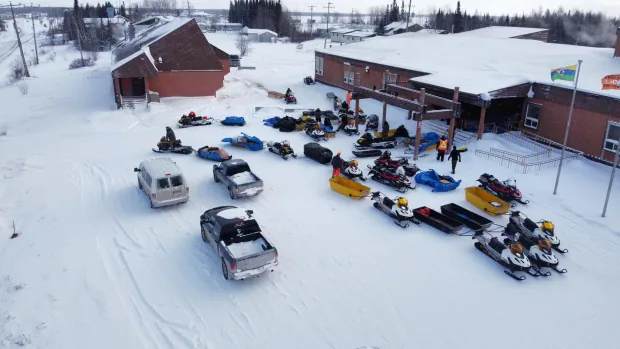More than half of Bearskin Lake — including most essential workers and leadership in the First Nation in Ontario — are now in quarantine, either having tested positive for the virus or living with someone who has.

In the week since the first cases of COVID-19 were detected in Bearskin Lake First Nation, the community in Ontario has been forced to rapidly shut down.
More than half of the about 400 people living in the remote northern community — including most essential workers and First Nation leadership — are now in quarantine, either as a confirmed case or because they live with someone who has tested positive for the virus.
But the First Nation isn’t alone, with surrounding communities doing everything they can to help out.
As of Tuesday morning, 187 people in Bearskin Lake, more than 600 kilometres north of Thunder Bay, have tested positive for COVID-19, according to Chief Lefty Kamenawatamin, among those who’ve had to go in isolation after someone in his household tested positive.
The federal government has offered $483,000 to help with food security, isolation spaces, transportation and wages for community workers.
That’s not enough, the chief said. What’s needed are boots on the ground to deliver essential supplies like food, medicine and chopped wood, he insisted, with about 90 per cent of homes relying on wood for heat.

Bearskin Lake First Nation has requested military assistance, although Kamenawatamin said he doesn’t expect a response this week.
As the community waits and watches the already limited numbers of available essential workers dwindle every day, surrounding First Nations and communities have mobilized to help.
“I am overwhelmed,” Kamenawatamin said. “There is so much support coming from our surrounding communities … calling us, encouraging us, praying for us.”
Items delivered by winter road, plane, ‘Ski-Doo train’
That support has gone beyond just words — fundraising, food drives and efforts to mobilize critical supplies have been taking place to help the people of Bearskin Lake.
On New Year’s Day, more than two dozen people from Kitchenuhmaykoosib Inninuwug gathered outside the school with their snowmobiles, loading the sleds with food, wood and other essential items like diapers.
With a wind chill making conditions feel colder than –40 C, what’s being described as a “Ski-Doo train” started the long trek to Bearskin Lake to deliver the items.

“People had to layer with warm clothing to brave the freezing temperatures. People wore traditional moose hides and beaver hats, with sleigh pants and parkas,” said John Cutfeet, who was part of the group.
Some even used plastic bags over their warm clothes to stop the wind.
Cutfeet said it was an arduous journey, with high winds and blowing snow forcing several stops to rearrange supplies and check on one another.

The group reached Severn River, just outside Bearskin Lake, where they left all the supplies for community members to bring in and distribute. Then, the Ski-Doo train turned around and returned to Kitchenuhmaykoosib Inninuwug.
Cutfeet said the entire trip took more than seven hours.
“Those are our relatives out there,” he said. “That emergency declaration was a call for help, and K.I. responded in the best way that we could.”

Similarly, seven trucks drove more than 100 kilometres from Muskrat Dam First Nation to Bearskin Lake, delivering loads of chopped wood to help heat homes during the late-December cold snap.
As well, nearby Wapekeka First Nation chartered a plane to deliver a load of food and supplies.
Fundraising drives in Sandy Lake, Pikangikum and Kenora raised more than $100,000 for the people of Bearskin Lake. Some will be given as a cheque to the First Nation, and some of the money was used to purchase and ship items like food and air purifiers.
“We are overwhelmed. So many people have stepped up to help out any way they can, and I just want to thank everyone,” Kamenawatamin said.
‘We know how it feels’
Gail Anishinabie helped organize the fundraising drive from Sandy Lake First Nation, where more than $50,000 was raised in the span of a week.
“Our community is a caring, kind and a compassionate community. When another community is in crisis, we all do what we can to help our neighbours in need,” Anishinabie said.
“It just shows that when our fellow neighbours are in need and crisis, that we have a lot of love and compassion.”

Anishinabie added that Sandy Lake is battling COVID-19 right now, with a few positive cases and households quarantining.
“We know how it feels, we know the devastation that it does to our community, but we can’t even imagine what Bearskin must be feeling,” she said.
Nishnawbe Aski Nation Grand Chief Derek Fox, who represents 49 First Nations across northern Ontario, said he is proud to see that support between communities, but there aren’t enough people in Bearskin Lake to package and distribute those supplies.

Fox, also a member of Bearskin Lake, said he wants to see the federal government provide more support and deploy the military assistance that was requested on Monday.
“We’re begging them for more support, begging them to acknowledge that this is a crisis that needs immediate action.”
In an emailed statement to CBC News on Monday afternoon, a spokesperson with the Department of National Defence said it had not yet received the official request, adding that any such request must be co-ordinated through Public Safety Canada.
Kamenawatamin said his community and the few essential workers left are working long hours, and are starting to burn out.
He said he needs immediate help, fearing this week will see a continued rise in COVID-19 cases and possibly the need for people to be flown out for hospitalization.

